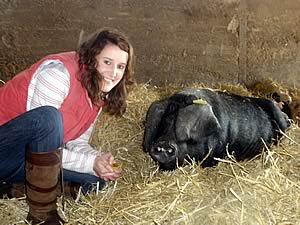 |
|||||||||
|
|||||||||||||||||||
|
|
Cross about Compliance? “Don’t take Single Farm Pay deductions lying down,” is the message to farmers from rural specialists George F. White who have recently argued and won several appeals on behalf of their clients.
For farmers throughout the length and breadth of the UK subject to deductions, they can have a significant impact with subsequent breaches applied on an increasingly severe sliding scale. Legislation is complex and can be misapplied so any decision is worth checking. The Single Farm Payment Scheme in Europe’s principle agricultural subsidy giving farmers freedom from quota linked production and rewarding environmentally friendly practices. Under European legislation, the Rural Payments Agency and three other bodies known as Competent Control Authorities must monitor at least 1% of farm businesses who apply for Single Farm Payments to check they comply with EU standards on public, animal and plant health, environmental and animal welfare. Known as ‘cross-compliance’, this is done on a random basis with breaches judged according to their severity, permanence or repetition. Payment reductions and exclusions can only be applied in cases where the farmer has acted negligently (or intentionally) and so inspectors also assess whether or not reasonable care, skill and foresight have been used. Kerry Graham from George F. White is urging farmers to carefully check any decisions regarding deductions as they can create a severe impact to cash flow: “This is a very complex area which can have significant impact on farm revenue. By looking into and researching the finer detail of the deductions and the Cross Compliance rules and regulations, we have been able to win appeals made on behalf of our clients.” Inspectors are looking to find breaches of the current Cross-Compliance rules; in the case of a livestock farmer this could include items such as missing ear-tags, incorrect passport details or incorrect recording of movement details. An initial breach is likely to receive a 1% reduction however the next time a breach is found it increases to 3%, then 9%, then 15% then 81%. Bearing in mind that a typical first fine can be £2000, the process can cover significant amounts of money. In addition the reduction applies not only to the Single Farm Payment but also any Hill Farm Allowance, Environmental Stewardship Schemes, Farm Woodland Premium & Farm Woodland Management Grant Schemes received in the same scheme year. By undertaking thorough investigations on behalf of its rural clients George F. White has been successfully won several appeals. The company gains a thorough understanding on what happens at the inspection, what the alleged breach is, the finer detail of the requirements related to the breach under the current guidance in the Cross Compliance Handbook and details of what reductions if any are applicable. In a recent case a farmer had his payments deducted for a claimed noncompliance with rules on re-tagging. However in the first instance, he should have received a Warning Letter giving him time to remedy the situation and as this wasn’t done, the decision was put to the Appeal process. As Kerry concludes, “It is clear that most people accept these penalties without appealing them, however given the considerable amount of money at stake, we would advise people to look further into any decision that the RPA has made to check that it has been correctly applied. You have nothing to lose and perhaps a significant rebate to gain.” Anyone interested in finding out more about Cross Compliance Regulation can contact Kerry Graham at the Alnwick office of George F. White on Tel. 01665 603 231. George F. White has offices in Alnwick and Tyne Valley in Northumberland, Wolsingham and Barnard Castle in County Durham, Bedale in North Yorkshire and Park Lane in London www.georgefwhite.co.uk.
|
||||||||||||||||||

|
|
||||||||||||||||||
| home | agri-services | pedigree
pen | news | dairy | beef | machinery BPS | property | organisations | site map |
|||||||||||||||||||

